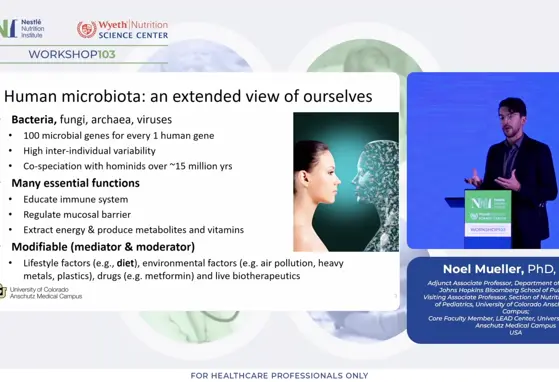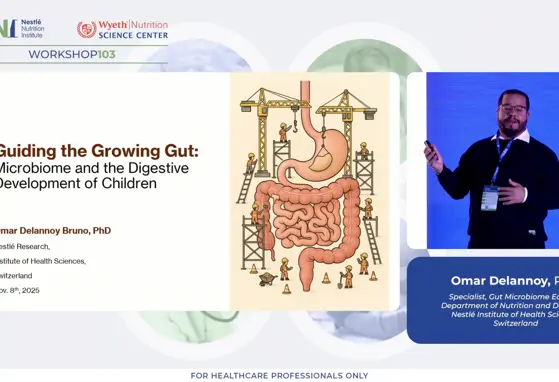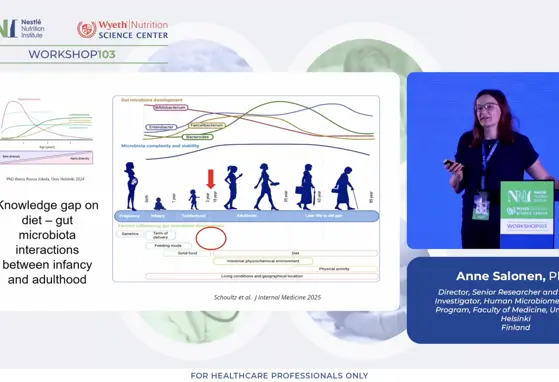NNIA CNE in the East Africa Region (EAR): Mauritius
The Nestlé Nutrition Institute Africa (NNIA) hosted the 2nd edition of its Continuous Nutrition Education (CNE) for the Indian Ocean Islands on 21 June 2012 at the Maritim Hotel, Balaclava in Mauritius. Around 100 health care professionals attended to discuss the recent advances in the pathophysiology and diagnosis of food allergies in infants. Paediatricians from the Seychelles, Comoros and Madagascar were present at the meeting to share their expertise and experience on this regional platform.
"The Institute promotes science for better nutrition and we are pleased to host the 2nd edition after the Seychelles last year," said Prof Roger Andrianasolo, Chief Nutritionist at the National Institute of Public Health in Antananarivo, and Vice President of the Nestlé Nutrition Institute Africa.
The Institute was also pleased to welcome Dr Michael Levin, distinguished lecturer, doctor in Paediatrics and allergy expert at the University of Cape Town in South Africa. Dr Levin is a member of the Executive Committees of the Allergy Society in South Africa and the National Program on raising awareness of asthma. He is a member of the European and American academies of asthma, allergy and clinical immunology. His collection of publication includes more than 30 scientific articles and chapters in peer reviewed medical publications.
In his opening speech, Mr Luigi Peccini, the Country Manager of Nestlé Mauritius emphasised that this conference aims to promote a public-private partnership in the field of nutrition including the sharing of scientific data that proves to be necessary to address the nutritional challenges caused by allergies. Dr Chand Domah, Regional Health Director from the Ministry of Health and past NNIA Board member was the chief guest for the event.
Over the last decades, the incidence of allergies has dramatically increased, to reach epidemic proportions. The World Health Organisation (WHO) now recognises allergies as a serious public health problem. Almost three times as many children are currently affected by asthma, skin and food allergies than were 30 years ago. Today atopic dermatitis is the first manifestation of allergic sensitisation, which affects up to 20% of children during their first two years of life. Not only do the allergies significantly impact on the quality of life of these children and their families; the treatment is also costly for health services because of their frequency and chronic nature. It is therefore of paramount importance to develop effective measures to prevent allergies.
In Mauritius there is currently very little data pertaining to food allergies in children. A study conducted in 2008 by Dr Pugo-Gunsam and her collaborators at the University of Mauritius revealed that Mauritians are generally more sensitive to seafood and food products such as peanuts, soy and chocolate. Although symptoms were varied, many survey participants reported to not always consulting a doctor whenever they have allergic reactions. This has led researchers to conclude that an educational campaign is needed to inform the public about potential risks of exposure to certain foods. Other research studies demonstrated that dust mites are the most common allergens that contribute to all-year round allergic symptoms in patients.
In general, the prevalence of food allergies in the Indian Ocean islands is not well documented and there are an increasing number of infants who are diagnosed with an allergy to cows’ milk protein. The diagnostic test available in public hospitals in Mauritius is the Total IgE and treatment most often involves the elimination of the causative food from the diet. In the Seychelles for instance, from clinical experience as explained by Mrs Madeleine, food allergies arise mainly from egg, milk, peanut, seafood: seashells (crabs, prawns, bernique, lobster), fish (cordonier, carangue), wheat, pineapple, tomatoes, eggplant and spinach. The same treatment as in Mauritius normally applies. In the Comoros and Madagascar, on the other hand, the diagnostic tools are still very expensive and priority is given to treatment of malnutrition and infectious diseases in the hospital settings.
Way Forward in the Management of Food Allergies in the IOI
Dr Levin shared some regional and wider links for allergy education and training to the participants. The creation of an allergy society in Mauritius in collaboration with the Allergy Society of South Africa has been identified as one of the stepping stones in addressing some of the short-term challenges in the management and diagnosis of allergies in the islands.
If you liked this post you may also like

Mindful Microbes: The Interplay Between Environment, Gut Microbiome, Brain, and Behavior

Exploring the Crosstalk: Nutrition, Microbiome, and Cardiometabolic Health

Guiding the Growing Gut: Microbiome and the Digestive Development of Children

Nourishing the Microbiome at Preschool age: Dietary influences from infancy to present